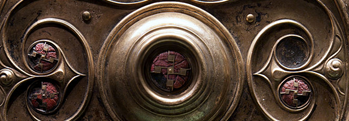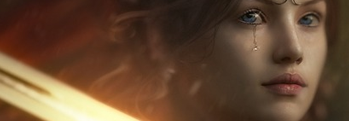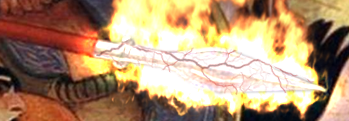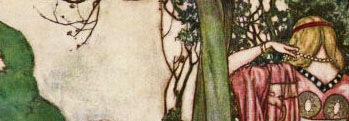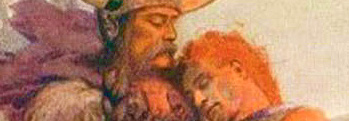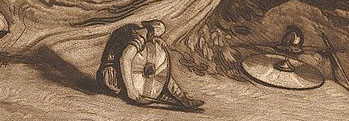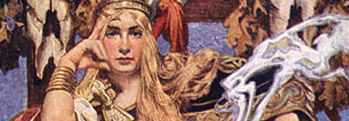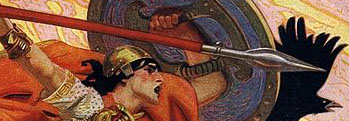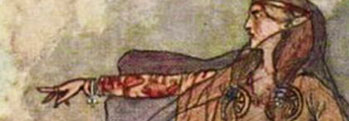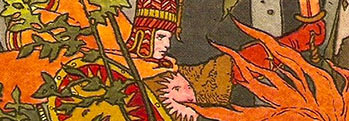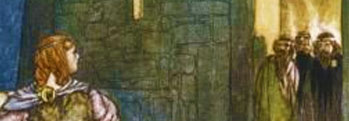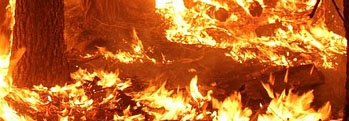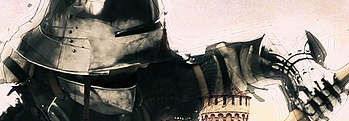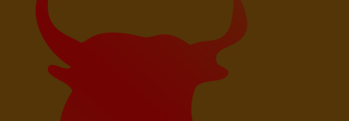Lugaid Red Stripes
Irish and Celtic myths and legends, Irish folklore and Irish fairy tales from the Ulster Cycle
Strange vines produce stranger fruit
 Irish legends have this peculiar property – so long and so often have they been repeated down through the millennia that oftentimes one tale might cross into another, over and back, and leave its track behind. Some stories are far older than they might seem, and some contain shadows and echoes stretching back to the very beginning.
Irish legends have this peculiar property – so long and so often have they been repeated down through the millennia that oftentimes one tale might cross into another, over and back, and leave its track behind. Some stories are far older than they might seem, and some contain shadows and echoes stretching back to the very beginning.
Such is the strange tale of Lugaid Red Stripes, who was also known as Red Sky. It was said he had three fathers, the Finn Emna, all of them brothers, and their names were Bres, Nár and Lothar, called the Three Beautiful Ones of Emain. Though their form was fair, their deeds were foul and they tried to seize the kingship of Connacht from their own father by force.
They wished for the High Kingship of Ireland too so they went to war with their father, but on the night before they attacked, camped with their armies outside the stronghold of Cruachu, their sister Clothru came to them and begged them not to go to war since fingal, or kin-slaying, was one of the worst crimes in Ireland at the time. She also said she feared they would produce no heirs, and lay with them.
From this joining was produced Lugaid, who had a red stripe about his neck, and another around his waist. Above the neck he resembled Nár, from the neck to the waist he resembled Bres, and from the waist down he resembled Lothar.
Five years after High King Conaire Mór died, Lugaid sat himself upon the Lia Fáil, the stone of kings which roared whenever the true king sat upon it, making a sound heard throughout Ireland. However the stone didn’t roar for Lugaid, and so his foster father, none other than the hero Cú Chulainn, split it in two with his sword.
Never again did it roar until Conn of the Hundred Battles sat upon it, and after that, never at all.
It happened shortly afterwards that a Queen of Ireland, whose name was Ethne, became pregnant. She kept in her court a Druid, and this Druid made a prophecy after gazing into the still waters of a sacred well by the reflected light of a waxing moon.
He foretold that the child would slay Lugaid’s mother, so Ethne fled to Cruachán in the east to have her child. Lugaid gave chase and drowned her in the well, then cut her child from her womb, casting it after her into the waters. This child was called Furbaide Fer-benn, he who had two horns on his temples.
This child would later grow to be a man and kill Lugaid’s mother Clothru in revenge, for which Lugaid killed Furbaide on a mountain top called Sliab Uillean.
Lugaid had a wife whose name was Derbforgaill, daughter of the king of icy Lochlann, which we today know as Scandinavia, although she didn’t come to Ireland seeking his hand in marriage! Instead she had heard of the mighty hero Cú Chulainn and loved him because of the famous stories people would tell about him.
She and her two handmaids travelled to Ireland in the shape of pure white swans joined by a golden chain. They came to Loch Cuan, Strangford Lough, where Cú Chulainn and Lugaid were fishing.
“Shoot at the birds,” said Lugaid.
Cú Chulainn hurled a stone at them with his fearsome sling, and the stone went between her ribs and lodged in her womb. The birds fell and changed into women again on the strand.
“You have done evil to me!” said Derbforgaill, “and I have come to find you.”
“It is true” said.
Seeing his error, Cú Chulainn sucked the stone out of the womb of the girl, so that it was in his mouth with the gush of blood that was around it. He refused to marry her however, saying
“The side that I have sucked, I will not mate with.”
“You will give me, then, to anyone you like?” she replied.
“Indeed I would like you to go with the noblest man in Ireland, that is, Lugaid of the Red Stripes.”
“That is fine with me,” said she, “provided that I may always see you!”
She went then with Lugaid and bore him a child.
Some time after that, when winter was at its coldest and snow lay thick upon the ground, the men of Ulster made pillars of snow, and the women competed to see who could loose water the deepest into the pillar and so prove herself the most desirable to men. One by one they each sat on top of a snow pillar and tried their best, but only Derbforgaill’s reached the ground.
The other women saw this and were filled with furious jealousy, thinking that no man would want them, so they got her alone, attacking and mutilated her, gouging out her eyes and cutting off her nose, ears, and hair. When their deed was done they dragged her to her house and left her inside.
Meanwhile the men were in an assembly on a hillock above Emain Macha.
“Strange it is to me, O Lugaid”, said Cú Chulainn, “that there is snow unmelted on Derbforgaill’s house!”
Lugaid knew the truth instantly – for if a woman of the north had not lit her hearthfire in the depths of winter’s grip, there could be only one reason.
“She is dying then,” said Lugaid.
They rushed with equal speed towards the house and broke in the door, and saw with horror what the women had done to her, and they saw her soul was not in her.
And so the song was written
Cú Chulainn bids me farewell,
to whom I came from my homelands,
and Lugaid, vigorous with action,
to whom I gave a love which he did not take away from me.
I must go far,
not good the journey I obtained.
The separation from them will be distressful,
unless disaster and death come to me.
With Cú Chulainn, with Lugaid,
with whom there was soon terror or fear.
If it were not for reproach and atonement,
there might be no regret for our union.
The union which was broken with Riab nDerg,
it is a thorn in the heart, blood of the breast.
Cú Chulainn is deprived,
unlucky if it were not for the sloping hillside of the enclosure.
If it were not for the sloping hillside of the enclosure of Lugaid.
with which every obstruction was reddened.
It was too soon our vain thing,
with the son of the three Finn Emna’s.
That I will not see Cú Chulainn,
has made me tearful of sadness.
Feeble my people, wretched wailing,
and parting from Lugaid.
My fian-friend has not betrayed me,
Cú Chulainn, he loved boasting.
I had a noble, joyous companion,
Lugaid son of Clothrann of Cruachan.
Gift of valour, gift of feat, surpassing everyone,
for Cú Chulainn, whose shape was famed.
Gift of weapons for valorous Lugaid,
gift of my shape beyond every woman.
Every victory is a defeat afterwards,
with whomever may be envied.
Every treasure will be wholly unlawful,
every strong man will be sorrowful, or will be doomed.
Full of longing a tryst in this world,
it is not a path to heaven that it makes.
A tryst with death has destroyed, beyond every treasure,
a fair face, though beautiful its lustre.
Not happy is a hard heart,
which trusts another people.
Frequently its shape changes,
its face in time of misery.
When we used to drive around Emain,
from Tara, it was not a bad exploit.
Cú Chulainn was joyful there,
and Lugaid son of Clothru.
Cú Chulainn conversing with me,
with deeds, daring, dark.
It is that which was the fullness of my heart,
and laying with Lugaid.
We have parted from our playing,
at which we might have been forever.
Perhaps we may not meet afterwards,
I have been destined to go to my death.
And with that died Lugaid on the spot.
Cú Chulainn was aghast at this turn of events and lost himself in fury, shining with his hero-light he went to the house to the women and he knocked down the house upon them. No man or woman came out alive from that house, that is, of the three fifties of queens, he killed them all.
Then Cú Chulainn said
Derbforgaill, bright white bosom,
she reached me over the torrent of the ocean.
It was a friend’s grace she bestowed on me,
a daughter of a king of Lochlann, noble.
Since it was between two graves,
my bloodied heart makes sorrow.
Derbforgaill’s face under a hill of stone,
Lugaid Riab nDerg, unfortunate.
Lugaid was greatly renowned,
good it was that slaughter was expected.
That is what Lugaid chose,
what was intended by Derbforgaill
Lugaid was greatly renowned,
he was carrying his bright spearshafts.
Fifty murderous blows to decapitated enemies,
by the lighting of every moon.
Derbforgaill, famed with beauty,
with purity and modesty.
She did not fall into vanity,
her face over her companions' shoulder.
Three fifties of women in Emain,
it is I who have slaughtered them.
Though we were to pledge before the king of the tribes,
Derbforgaill was as valuable as they were.
And then he raised the mound and grave of Derbforgaill, that is Dér, daughter of Forgall, king of Lochlann.
Strangford Lough can be found on the map below!
Further Tales from the Ulster Cycle
Alone in County Louth rises a tall standing stone, its only company the ravens overhead and the whispering wind given voice by nearby trees. This is Clochafarmore, which means "the stone of the great man". It was first raised during the bronze age and rises to ove three meters in height, in a place whose name means The Field of Slaughter, ... [more]
War and the arts of war much occupied the people of Ireland, who became renowned for their skill with weapons and in the ways of battle. They fought one another and the many invaders who came to this land, earning not only fame for their arms and the swords and spears they carried, but for their shields as well! Some of the most legended shields ... [more]
Irish legends have this peculiar property – so long and so often have they been repeated down through the millennia that oftentimes one tale might cross into another, over and back, and leave its track behind. Some stories are far older than they might seem, and some contain shadows and echoes stretching back to the very beginning. Such is ... [more]
Bláthíne, whose name means “little flower” in Irish, was one of the ladies of the Tuatha Dé Danann, that mystical race of warlocks whose hardened red-gold bronze had shimmered in the sunshine when they ruled Ireland. Her beauty was famed throughout this world and the otherworld, but her story is a warning to all who ... [more]
It was often the way in olden times in Ireland that women would fight alongside the men, fierce and unbowed, and accorded the honour of warriors too. So it was with the fearless Scáthach, the legendary Scottish warrior woman whose name meant "the Shadow"! She lived in a sinister castle called Dún Scáith, or the For ... [more]
Many and infamous were the weapons of the tribes of Ireland, and fierce the warriors who wielded them in battle, but few were as notorious as the spear of fire and poison, the Lúin Cheltchair, which thirsted for blood so much that it had to be kept in a cauldron of poison, held down with chains by four foreigners – for who would risk t ... [more]
Cúchulainn, although still a young man, had made many powerful enemies, but none more bitter and dark than Queen Medb of Connaught, whose armies he had routed and whose ambitions he'd thwarted. Long into the dark nights of winter, year after year she brooded on the humiliations visited upon her, for undying is the wrath of a Queen. Sh ... [more]
Queen Medb had invaded Ulster and the lands of the north, thinking it would be an easy victory since the men of Ulster were crippled with birth pangs as a result of a curse place on them, but Cúchulainn had dogged her every step savagely. Attacking her supply wagons, ambushing her men from the trees, burning tents at night, he fought sing ... [more]
Queen Nessa had been known as a gentle and sweet natured woman when she was a maid, but through the hardships of the world she became cold and ruthless. Still, for all that she was still a rare beauty and an indomitable warrior, which many men find to be an irresistible combination! And so it was with King Fergus Mac Ríoch, master of all ... [more]
They say the fury of a storm in a high tempest has nothing on the fury of a woman scorned, and few women have ever felt quite so scorned as Aoife the warrior-queen after she found out that her lover Cúchulainn had married another woman, Emer! She had borne a son for him, but in her wrath she decided to turn the child against him. She spok ... [more]
In the age of heroes, forgotten by all but the storytellers and the legend-weavers, when champions strode the land of Ireland, their halls and Duns now covered in moss, echoing to no songs but those of the blackbird and the red-breasted robin, the people of Ulster were gathered together for a great celebration at Emain Macha, the capital of Ulster. ... [more]
A quarrel arose between Queen Medb of Connacht and the King of Ulster regarding who had the most wealth, but all of his men were cursed with the pains of a pregnant woman giving birth so they couldn't ride out to meet her marching army. Only Cúchulainn who had the blood of the Sidhe running through his veins could even walk, let alone fi ... [more]
Cathbad the Druid was well known throughout the lands of Ireland for his subtle skill and cunning ways, he could make birds speak the language of men and the very stones themselves sing, it was said! But like all Druids, he could also tell the portents of the day, as the ripples may be seen from a rock cast into a still pool in the deepest forest. ... [more]
Cruinniuc was a farmer in the northern part of Ireland back in the days of legend, and often legends are told of heroes and their mighty deeds, but this tale is about humbler folk who change the path of history nonetheless. Cruinniuc wasn't a bad sort but his life had been struck with ill fortune for years – his wife had passed away an ... [more]
The chariot games in Ireland of old were a great event – the mightiest of kings, warriors, princes and champions from around the world would travel from afar to watch and join the fiercely contested races. Each man and his team of horses would thunder round the track, and the cheers of the onlookers would shake the hills. And so it was for ... [more]
It was the time of heroes in ancient Ireland, when giants walked the land, before Fionn MacCumhaill had sent the seven shadows of the Glen back to their dark and restless sleep with his flashing sword, and even before his son Oisín had slain the worm of the lakes, when Setanta was young. He it was who became one of the mightiest heroes of ... [more]
King Aillil, husband to Queen Medb whose famous cattle raid started a war with Cú Chulainn, was deep in his cups as the sun set on Samhain night, red and cloud-torn over the ancient fortress of Rathcroghan. Bothered by the whispering winds, he took a notion that it would be a good test of courage if one of his warriors would go out and put a ... [more]
Bricriu of the venomous tongue he was called, and well named indeed he was, for he loved nothing better than to cause trouble and spread rumours and half-truths to unsettle people. As such he decided to hold a great feast, although he knew that by his reputation few would be interested in attending, so he made a special effort to entice them. He ... [more]
One of the most famed legends of old is that of the war that was fought over the Brown Bull of Cualgne. Now while it might seem an odd thing for us today to think of a war fought over a bull, the matter is not so simple as it might seem, and the bull was no ordinary bull either! For it was in the time of Cú Chulainn, the hound of Chulainn, t ... [more]





